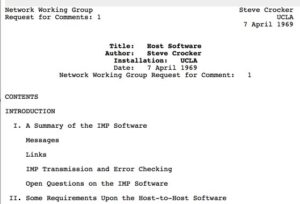RFC 1 Defines the Building Block of Internet Communication
Steve Crocker, a graduate student at UCLA and part of the team developing ARPANET, writes the first “Request for Comments“. The ARPANET, a research project of the Department of Defense’s Advanced Research Projects Agency (ARPA), was the foundation of today’s modern Internet. RFC 1 defined the design of the host software for communication between ARPANET nodes. This host software would be run on Interface Message Processors or IMPs, which were the precursor to Internet routers. The “host software” defined in RFC 1 would later be known as the Network Control Protocol or NCP, which itself was the forerunner to the modern TCP/IP protocol the Internet runs on today.
There is a very interesting history to how RFCs came about, itself fittingly documented in RFC 1000. Long story short, the initial design of the ARPANET was not well defined. The students and researchers on the ARPANET team were expecting professionals from the government to come in and define their objectives more clearly. As it started to become evident that there was no specific design forthcoming and possibilities were being discussed informally, the working group decided that they should start writing down and organizing their ideas. However, they were also concerned that by formally documenting their concepts that it might seem like they were taking authority and would possibly offend some hypothetical “official protocol designers” from the government. Therefore Steve Crocker chose to carefully title the document “Request for Comments” so that the point was made that these were not official publications and that in fact, they were asking for others working on the project to add their input. As more RFC documents were written describing and defining the earliest building blocks of the ARPANET, these became the unofficial method of documentation and discussion within the ARPANET Networking Working Group (itself loosely defined in RFC 3). This laid the foundation for the eventual Internet Engineering Task Force (IETF) which today establishes many official Internet Standards. Today RFCs are the official publication of the IETF where Internet developments are proposed and official Internet Standards are defined. As of early 2023 there have been nearly 9500 RFCs published.

